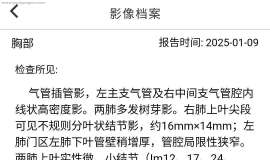马дёҠжіЁеҶҢпјҢз»“дәӨжӣҙеӨҡеҘҪеҸӢпјҢдә«з”ЁжӣҙеӨҡеҠҹиғҪпјҢи®©дҪ иҪ»жқҫзҺ©иҪ¬зӨҫеҢәгҖӮ
жӮЁйңҖиҰҒ зҷ»еҪ• жүҚеҸҜд»ҘдёӢиҪҪжҲ–жҹҘзңӢпјҢжІЎжңүиҙҰеҸ·пјҹз«ӢеҚіжіЁеҶҢ

x
http://www.aacr.org/home/public- ... he-news.aspx?d=2547
Amplification of anaplastic lymphoma kinase, which has been reported in other cancers such as non-small cell lung cancers, may be a primary driver of the rapid metastasis that patients with inflammatory breast cancer experience.
If validated, the use of anaplastic lymphoma kinase (ALK) inhibitors may be a new treatment approach for patients with this lethal form of breast cancer.
These data were presented at the AACR-NCI-EORTC International Conference: Molecular Targets and Cancer Therapeutics, held Nov. 12-16, 2011.
вҖңA diagnosis of inflammatory breast cancer carries with it a very low five-year survival rate of about 40 percent, clearly indicating the critical need for an understanding of the molecular basis of the disease,вҖқ said Fredika M. Robertson, Ph.D., professor in the department of experimental therapeutics at The University of Texas M.D. Anderson Cancer Center and a member of the Morgan Welch Inflammatory Breast Cancer Research Program. вҖңHowever, there are few molecules that have been identified that are matched with available targeted therapies of clinical benefit in patients with inflammatory breast cancer.вҖқ
Robertson and colleagues used patient-derived tumors, tumor cell lines and animal models to evaluate protein-signaling pathways and genetic abnormalities with the goal of identifying molecules that may be associated with the increased metastases of inflammatory breast cancer. They discovered ALK amplification in 13 of 15 tumor samples taken from patients with this lethal variant of breast cancer. They then validated the presence of this abnormality in tumor cell lines and newly developed xenograft models.
Gene amplification of ALK is only found in about 2 percent of the overall breast cancer population, according to Robertson. However, results from this analysis indicate that in inflammatory breast cancer, it could be occurring in up to 86 percent of patients.
вҖңThe observation that ALK is amplified may be comparable to the observation of HER2 oncogene amplification in some cases of breast cancer, which revolutionized how the disease was treated,вҖқ Robertson said. вҖңOur observation that ALK is amplified in inflammatory breast cancer suggests that ALK may serve as a good target for treatment.вҖқ
To test this, the researchers evaluated the effects of a drug that inhibits ALK using tumor cells isolated from patients with metastatic inflammatory breast cancer and in two animal models that recapitulate the disease. Results indicated that the use of this drug resulted in tumor cell death.
вҖңPatients with inflammatory breast cancer are now being evaluated for ALK genetic abnormalities, and if found and eligible, may be enrolled in a phase 1, dose-escalation clinical trial of a small-molecule ALK/cMet inhibitor,вҖқ Robertson said. She added that Massimo Cristofanilli, M.D., chair of medical oncology at Fox Chase Cancer Center in Philadelphia has implemented this trial at the centerвҖҷs Inflammatory Breast Cancer Clinic.
Moving forward, Robertson emphasized the importance of collaborating with a research team with expertise in using both proteomic and genomic approaches to define molecular biology of tumors, to identify therapeutic targets and, once validated, to rapidly translate these findings to the clinic.
вҖңOur results demonstrate that, had we only been using genomic platforms, the likelihood of identifying ALK as a therapeutic target would have been significantly diminished,вҖқ she said.
The funding for these studies came from an American Airlines Susan G. Komen for the Cure Promise Grant KGO81287 entitled, вҖңNovel Targets for Treatment and Detection of Inflammatory Breast Cancer.вҖқ Robertson and Cristofanilli are co-principal investigators on this grant. The proteomics studies were performed in collaboration with Emanuel F. Petricoin III, Ph.D., and Lance Liotta, M.D., Ph.D., at the George Mason Center for Applied Proteomics and Molecular Medicine in Manassas, Va.
д№іи…әзҷҢдёӯALKжү©еўһеҸӘеҚ 2%е·ҰеҸіпјҢиҖҢеңЁзӮҺжҖ§д№іи…әзҷҢдёӯALKжү©еўһеҲҷиҫҫ86%гҖӮзӣ®еүҚжӯЈеңЁеҮҶеӨҮејҖеұ•ALK/C-METеҸҢйҮҚжҠ‘еҲ¶еүӮжІ»з–—зӮҺжҖ§д№іи…әзҷҢзҡ„IжңҹдёҙеәҠе®һйӘҢгҖӮ
зӮҺжҖ§д№іи…әзҷҢеңЁд№іи…әзҷҢдёӯжҳҜзӣёеҪ“йҡҫжҗһзҡ„пјҢALK/C-METжҠ‘еҲ¶иҚҜзү©зҺ°жҲҗзҡ„е°ұжҳҜе…ӢйҮҢе”‘жӣҝе°јгҖӮ |


